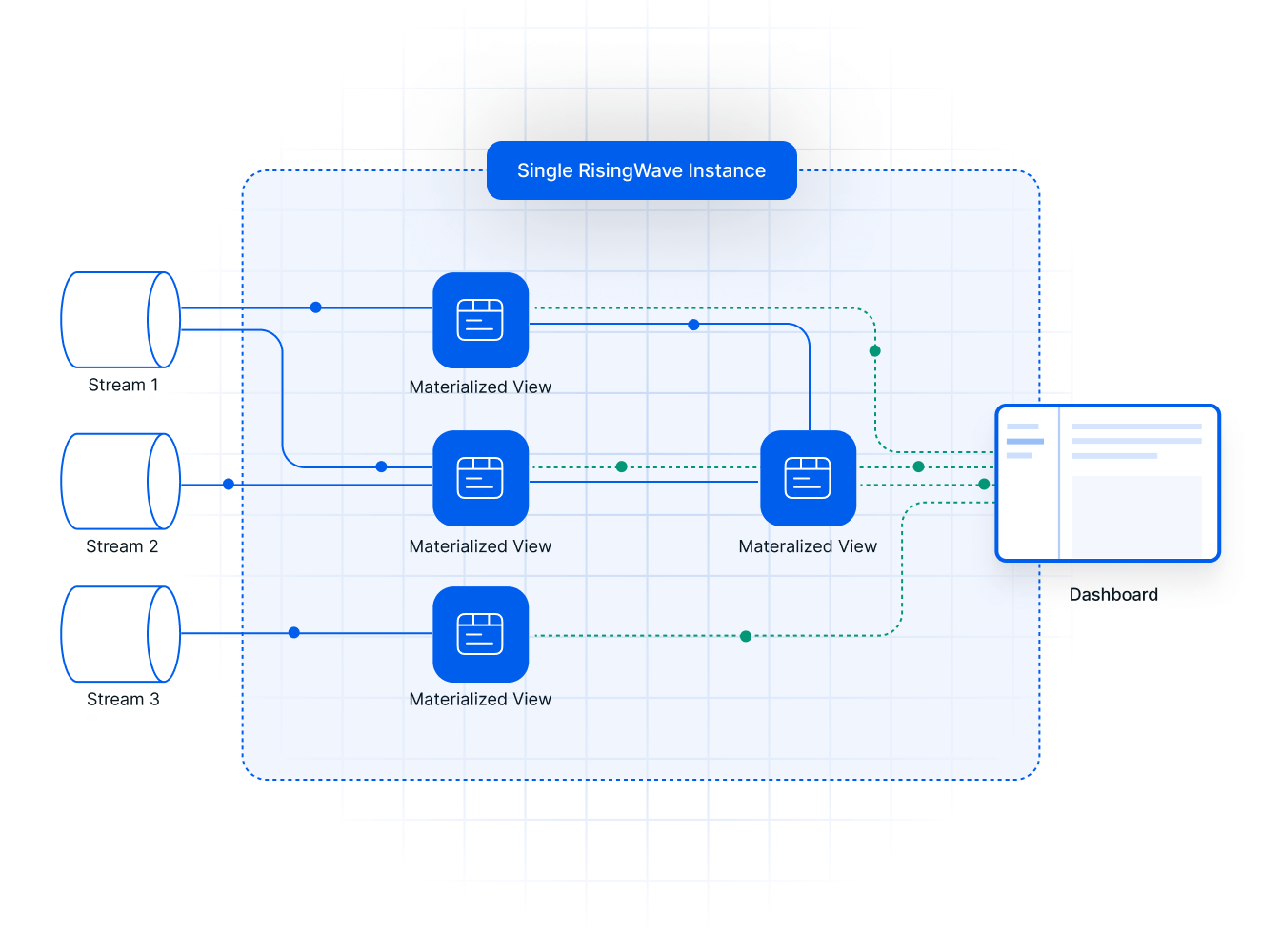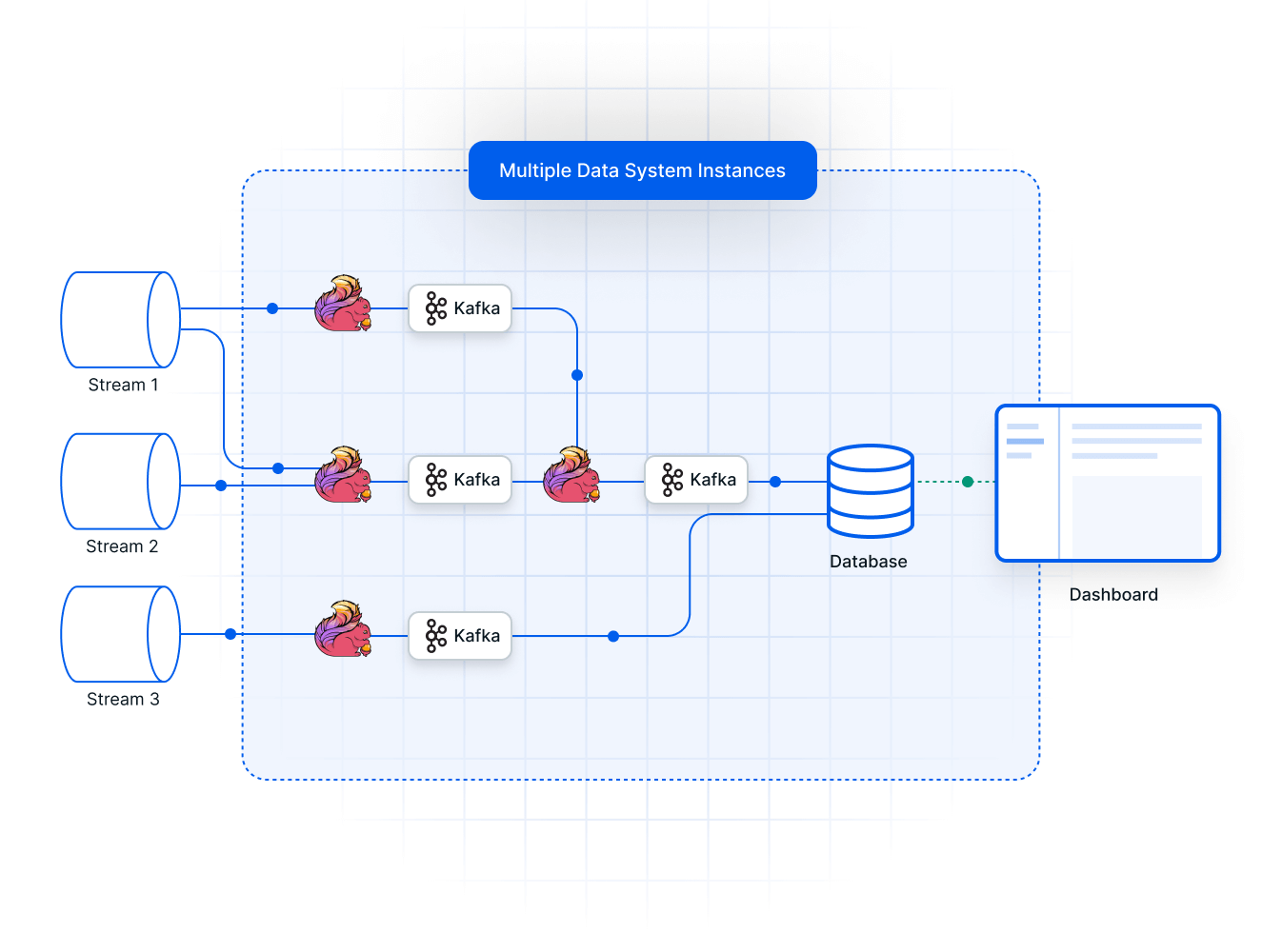
Why Choose RisingWave Over Apache Flink
A simpler and more efficient approach to streaming
Both RisingWave and Apache Flink are designed for building real-time stream processing applications. But they differ drastically in design, user experiences, and cost efficiency.

highlights
RisingWave is Remarkably Easier to Use and Significantly More Cost-efficient than Flink
10x
Cost Efficiency
RisingWave is highly optimized for performance and efficiency, especially with complex queries like joins, aggregations, and time windowing.
<10s
Dynamic Scaling
RisingWave supports near-instantaneous dynamic scaling without any service interruptions. Not minutes or hours.

PostgreSQL
RisingWave speaks PostgreSQL-style SQL, enabling users to dive into stream processing in much the same way as operating a PostgreSQL database.
Choose Friction-Less Path to Stream Processing
Say goodbye to:
Steep Learning Curves
Manual State Management
Endless Query Optimizations
RisingWave

With PostgreSQL compatibility, RisingWave allows you to build applications effortlessly using a familiar PostgreSQL-style experience. Developers can hit the ground running without needing to learn a new system from scratch.
Apache Flink
Requires extensive training and expertise, with a complex API and steep learning curve that slows down development, making it challenging for those not already familiar with its intricacies.
RisingWave
Flink
Reduce the Complexity of Your Event-Driven Architecture
Both RisingWave and Apache Flink are designed for building real-time stream processing applications.
Flink specializes in stream processing, but it relies on other datastores for serving real-time data, which may not be optimized for that purpose. In contrast, RisingWave is built on Unified batch and stream processing architecture with built-in serving layer. This is crucial because it enables data processing within a single framework and reducing complexity and cost.
What Makes RisingWave
the Clear Choice for Cost Efficiency?
the Clear Choice for Cost Efficiency?
RisingWave
RisingWave was created during the cloud era. By adopting a modern decoupled compute and storage architecture.
- RisingWave achieves better elasticity and cost efficiency. In particular RisingWave persists its data in S3 or other compatible cloud storage services.
- RisingWave can handle complex streaming joins over large time windows and recover from failures in seconds, not minutes or hours.
- The new architecture also allows each component to be optimized separately, reducing resource waste and avoiding task overload.
Apache Flink
As a computing framework born during the Hadoop-dominant big-data era, the architecture of Flink was heavily influenced by the MapReduce paradigm. The coupled compute and storage architecture enables Flink to achieve high parallelism and scalability.
However, this very architecture can give rise to concerns regarding execution costs. Due to the nature of its local state storage, e.g. RocksDB, Flink needs to scale large enough to handle large streaming joins and other stateful stream processing tasks.
However, this very architecture can give rise to concerns regarding execution costs. Due to the nature of its local state storage, e.g. RocksDB, Flink needs to scale large enough to handle large streaming joins and other stateful stream processing tasks.
As a computing framework born during the Hadoop-dominant big-data era, the architecture of Flink was heavily influenced by the MapReduce paradigm. The coupled compute and storage architecture enables Flink to achieve high parallelism and scalability.
However, this very architecture can give rise to concerns regarding execution costs. Due to the nature of its local state storage, e.g. RocksDB, Flink needs to scale large enough to handle large streaming joins and other stateful stream processing tasks.
However, this very architecture can give rise to concerns regarding execution costs. Due to the nature of its local state storage, e.g. RocksDB, Flink needs to scale large enough to handle large streaming joins and other stateful stream processing tasks.
Read More
Stream Processing Made Easy
More Reasons to Move to RisingWave
While Apache Flink offers flexibility, RisingWave's ease of use and cost-efficiency have led to its increasing preference among enterprises and fast-growing companies over Apache Flink for stream processing.
| RisingWave | Apache Flink | |
|---|---|---|
| License | Apache License 2.0 | Apache License 2.0 |
| System category | Streaming database | Stream processors |
| Architecture | Cloud-native Decoupled compute-storage | MapReduce-style Coupled compute-storage |
| Programming API | SQL + UDF (Python, Java, and more) | Java, Scala, Python, SQL |
| Client libraries | Java, Python, Node.js, and more | - |
| State management | Native storage persisted in S3 or equivalent storage | RocksDB in local machine; periodically checkpointed to S3 |
| Query serving | Support concurrent ad-hoc SQL query serving | Support batch mode execution |
| Correctness | Support exactly-once semantics, out-of-order processing, snapshot read, and consistent read | Support exactly-once semantics and out-of-order processing |
| Integrations and tooling | Big-data ecosystem, cloud ecosystem, and PostgreSQL ecosystem | Big-data ecosystem |
| Learning curve | Extremely shallow (PostgreSQL-Like experience) | Steep (Flink-specific interface) |
| Failure recovery | Instant | Minutes to hours (depending on specific system configuration) |
| Dynamic scaling | Transparent and instant | Stop the world |
| Performance cost | Low (especially when handling complex queries like joins) | High |
| Typical use cases | Streaming ETL, streaming analytics, online serving | Streaming ETL, streaming analytics |
RisingWave
| License | Apache License 2.0 |
| System category | Streaming database |
| Architecture | Cloud-native Decoupled compute-storage |
| Programming API | SQL + UDF (Python, Java, and more) |
| Client libraries | Java, Python, Node.js, and more |
| State management | Native storage persisted in S3 or equivalent storage |
| Query serving | Support concurrent ad-hoc SQL query serving |
| Correctness | Support exactly-once semantics, out-of-order processing, snapshot read, and consistent read |
| Integrations and tooling | Big-data ecosystem, cloud ecosystem, and PostgreSQL ecosystem |
| Learning curve | Extremely shallow (PostgreSQL-Like experience) |
| Failure recovery | Instant |
| Dynamic scaling | Transparent and instant |
| Performance cost | Low (especially when handling complex queries like joins) |
| Typical use cases | Streaming ETL, streaming analytics, online serving |







